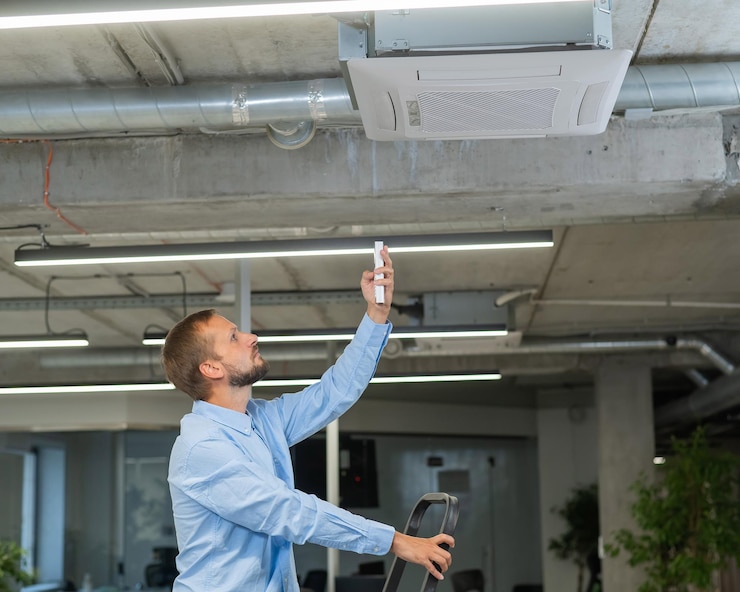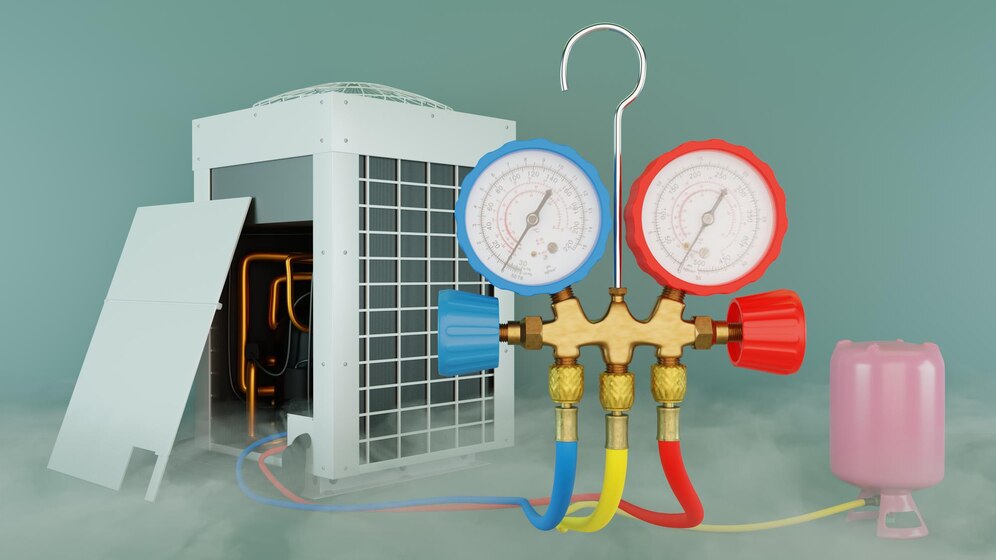
In the scorching heat of summer, a well-functioning air conditioning system is essential for keeping your home cool and comfortable. However, AC problems can arise unexpectedly, leading to discomfort and inconvenience. To avoid costly repairs and breakdowns, it’s essential to take proactive measures to prevent common AC problems before they occur. In this article, we’ll explore effective strategies for maintaining your AC system, including regular maintenance schedules, monitoring air filters, cleaning coils, checking refrigerant levels, and addressing unusual noises or odors promptly.
By following these preventive measures, you can ensure smooth operation of your AC system and enjoy uninterrupted comfort throughout the summer months. Trust in the expertise of Tradewind Heating and Air to provide comprehensive AC maintenance services in Orange, California, keeping your system in top condition for optimal performance and comfort.
Heating and Air Conditioning Services
Regular Maintenance Schedules
Establishing a regular maintenance schedule for your air conditioning (AC) system is essential for ensuring long-term performance and reliability. By staying proactive with maintenance, you can identify and address potential issues before they escalate into costly repairs or system failures.
Professional HVAC maintenance should be scheduled at least once a year, ideally before the onset of the cooling season. During these maintenance visits, trained technicians will thoroughly inspect and tune up your AC system, checking for any signs of wear, damage, or inefficiency.
Key tasks during a maintenance appointment may include inspecting and cleaning the condenser and evaporator coils, checking refrigerant levels, lubricating moving parts, inspecting electrical connections, and testing system controls. Additionally, technicians will assess overall system performance and address any concerns or issues that may affect efficiency or comfort.
Monitoring Air Filters: A Simple Yet Crucial Task
Monitoring and replacing air filters is a simple yet crucial task that can significantly impact the performance and longevity of your air conditioning (AC) system. Air filters serve as the first line of defense against airborne particles, dust, and debris, helping to maintain indoor air quality and protect the internal components of your AC unit.
Over time, air filters can become clogged with dirt, dust, pet dander, and other pollutants, restricting airflow and hindering the efficiency of your AC system. When airflow is restricted, your AC system must work harder to maintain the desired temperature, leading to increased energy consumption, reduced cooling capacity, and potential strain on system components.
Cleaning Condenser Coils and Evaporator Coils
Regular cleaning of both the condenser coils and evaporator coils is crucial for maintaining the efficiency and longevity of your air conditioning (AC) system. Over time, these coils can accumulate dirt, dust, pollen, and other debris, hindering heat transfer and impairing the cooling efficiency of your AC unit.
To prevent common AC problems and ensure optimal performance, it’s important to schedule regular cleaning of your coils as part of your routine maintenance routine. Typically, this maintenance task should be performed at least once a year, preferably before the start of the cooling season when your AC system will be in heavy use.
Cleaning the condenser coils, located in the outdoor unit of your AC system, involves removing dirt and debris that may have accumulated on the coils. Use a soft brush or vacuum cleaner to gently remove the buildup, taking care not to damage the delicate fins of the coils. Additionally, you may need to use a coil cleaner or mild detergent solution to thoroughly clean the coils and remove any stubborn dirt or grime.
Similarly, the evaporator coils, located inside the indoor unit of your AC system, also require regular cleaning to maintain efficiency. These coils can become dirty due to dust and debris carried by the indoor air. To clean the evaporator coils, carefully remove any access panels or covers to gain access to the coils. Use a soft brush or vacuum cleaner to remove dirt and debris, taking care not to bend or damage the coils.

Checking Refrigerant Levels and Ensuring Proper Insulation
Checking refrigerant levels and ensuring proper insulation are crucial steps in maintaining the efficiency and performance of your air conditioning system. Refrigerant plays a vital role in the cooling process, absorbing heat from indoor air and transferring it outside to create a comfortable indoor environment. Improper refrigerant levels can lead to reduced efficiency, increased energy consumption, and potential system malfunctions.
To prevent common AC problems associated with refrigerant issues, it’s essential to periodically check refrigerant levels and ensure they are within the manufacturer’s recommended range. Low refrigerant levels may indicate a leak in the system, which can lead to inefficient operation and potential damage to the compressor. Conversely, overcharging the system with refrigerant can also negatively impact performance and efficiency.
Addressing Unusual Noises or Odors Promptly
Addressing unusual noises or odors coming from your air conditioning (AC) system promptly is crucial for preventing common AC problems and ensuring optimal performance and reliability. Unusual sounds or odors can often indicate underlying issues that, if left unaddressed, may lead to more significant problems and potentially costly repairs.
When you notice any unusual noises, such as banging, grinding, hissing, or squealing, or detect strange odors, such as musty or burning smells, emanating from your AC system, it’s essential to take action promptly. These warning signs could be indicative of various issues, including loose or damaged components, refrigerant leaks, electrical malfunctions, or even mold growth within the system.
Ignoring these warning signs and continuing to run your AC system under such conditions can exacerbate the problem, potentially causing further damage to the system and compromising its efficiency and performance. Additionally, some issues, such as refrigerant leaks, can pose health risks to occupants and may require immediate attention.
To address these issues and prevent common AC problems from escalating, it’s recommended to schedule a professional inspection and repair as soon as possible. A qualified HVAC technician can thoroughly assess your AC system, diagnose the root cause of the problem, and perform the necessary repairs or maintenance to resolve it effectively.
Preventing Com AC Problems Before They Arise at Tradewind HVAC
Preventing common AC problems before they arise is essential for maintaining the efficiency, performance, and longevity of your air conditioning system. By following a proactive approach to maintenance and addressing potential issues promptly, you can enjoy uninterrupted comfort and peace of mind throughout the summer months.
Incorporate regular maintenance schedules, monitor air filters, clean coils, check refrigerant levels, and address unusual noises or odors promptly to keep your AC system running smoothly and efficiently. With these preventive measures in place, you can stay cool and comfortable all summer long, without the worry of unexpected AC problems. Contact us today to schedule your AC maintenance and ensure your system is ready for the season ahead.

FAQs
- Why is regular maintenance important for my air conditioning system?
Regular maintenance is crucial for ensuring the long-term performance and reliability of your air conditioning (AC) system. It helps identify and address potential issues before they escalate into costly repairs or system failures, ensuring uninterrupted comfort and efficiency.
- How often should I schedule professional HVAC maintenance for my AC system?
Professional HVAC maintenance should be scheduled at least once a year, ideally before the start of the cooling season. During these visits, trained technicians will inspect and tune up your AC system to ensure optimal performance and efficiency.
- Why is monitoring and replacing air filters important for AC maintenance?
Monitoring and replacing air filters are essential for maintaining airflow and protecting the internal components of your AC system. Clogged filters can restrict airflow, reduce efficiency, and lead to increased energy consumption and strain on system components.
- What are the benefits of cleaning condenser coils and evaporator coils?
Regular cleaning of condenser coils and evaporator coils is crucial for maintaining the efficiency and longevity of your AC system. It helps remove dirt, dust, and debris that can hinder heat transfer and impair cooling efficiency, ensuring optimal performance.
- How can I check refrigerant levels, and why is it important?
Checking refrigerant levels is essential for maintaining the efficiency and performance of your AC system. Proper refrigerant levels ensure efficient heat transfer and cooling capacity, while improper levels can lead to reduced efficiency, increased energy consumption, and potential system malfunctions.
- What should I do if I notice unusual noises or odors coming from my AC system?
If you notice unusual noises or odors coming from your AC system, it’s essential to address them promptly. These warning signs could indicate underlying issues that may lead to more significant problems if left unattended. Schedule a professional inspection and repair to diagnose and resolve the issue effectively.
- How can I ensure my AC system is ready for the summer months?
To ensure your AC system is ready for the summer months, incorporate regular maintenance schedules, monitor air filters, clean coils, check refrigerant levels, and address any unusual noises or odors promptly. These preventive measures will help keep your AC system running smoothly and efficiently throughout the season.
- What are some common signs that indicate my air conditioning system needs maintenance?
Common signs that indicate your air conditioning system needs maintenance include reduced cooling performance, increased energy bills, unusual noises or odors, frequent cycling on and off, and visible signs of wear or damage. If you notice any of these signs, it’s essential to schedule a professional inspection and maintenance service.
9. Can I perform AC maintenance tasks myself, or should I hire a professional?
While some maintenance tasks, such as replacing air filters, can be performed by homeowners, certain tasks, such as cleaning coils and checking refrigerant levels, require the expertise of a professional HVAC technician. Hiring a professional ensures thorough and effective maintenance, reducing the risk of potential issues and ensuring optimal performance.
10. What are the benefits of preventive AC maintenance?
The benefits of preventive AC maintenance include improved energy efficiency, extended system lifespan, reduced risk of breakdowns, enhanced indoor comfort, and lower energy bills. By taking proactive measures to maintain your AC system, you can enjoy uninterrupted comfort and peace of mind while avoiding costly repairs and unexpected breakdowns.
